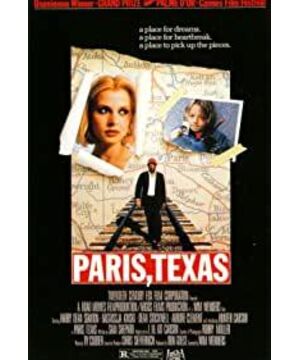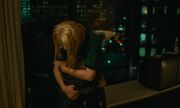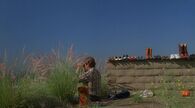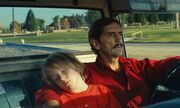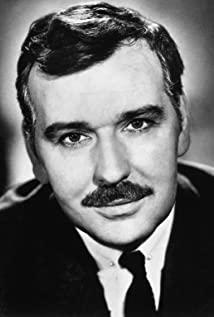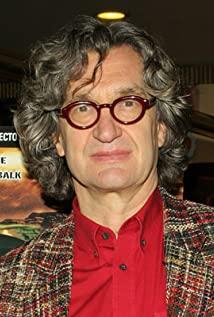As soon as it came up, it was such a stunning and intoxicating opening
of a road movie with the theme of discovering a person's past. Memories unfolded gradually over the two journeys. LA is a symbol of civilized life, and Texas is the beginning and end of Travis. It contained his past, so when he returned to civilized life, he had to go back one more time to get it back.
Searching has always been an excuse for the protagonist to flee in Wenders' films, symbolizing the desire of every dazed person living in this world to resist nothingness. But what they are looking for and what they are escaping from, even they themselves do not know, an extremely vague or even empty ideal, which seems to be just a pretext for wandering aimlessly and duplicity. The character flaws of these people make it impossible for them to get out of the predicament on their own, causing only inexplicable behaviors that are weak again and again. They need a simple or rational guide, a redemption... The film's thoughtful landscape shots, restrained and silent philosophical thoughts, and warm family relationships are sincere and touching. The male protagonist Travis fled passively from the beginning to gradually actively pursued, from silent silence to the last lengthy confession. The images present an otherworldly realm in the rambling, and the wandering and loneliness of modern people is embodied as a state of seeking or escaping on the road. The lonely, sad, and wandering male protagonist in the film also fits some of Wenders' own projections.
Many people compare this movie to "King of the Highway". I saw "The King of the Road" a long time ago, and my impression is very vague. I just remember that it is a pure German film, with thinking everywhere, and a very imagery landscape. It is very profound and depressing. In contrast, "Texas, Paris" is much easier to accept. From the unguided taste in this film to the art of the film, we can slowly feel the thinking contained in it in the image, think a little, and effortlessly.
Of course, the real artistic achievement of the film seems far inferior to Wenders' previous German films, but it may be precisely for this reason that it succeeds. The world is more willing to appreciate ", and praised it without hesitation. After all, most people are watching movies, not capable of researching them.
The protagonist of the film, Travis, is a man with some kind of character flaw that is common in Winstead films, a man who is in crisis because of emotional problems. The status quo is unsatisfactory, and I always try to find some comfort. The future is full of confusion. They abandoned the crowd, always "walked" on the road, and stumbled upon others during the journey, but they were unable to open their hearts from beginning to end. They continued on the road to hide the emptiness and helplessness in their hearts.
There are many impressive details, the most profound is the touching monologue of the hero. The lovers who once seriously injured each other did not meet in the end, and the thick single-sided glass separated from each other separated two scarred hearts. Sound becomes the only medium that connects each other, and human beings seem so weak, pathetic, and helpless at this moment. The two people who were the most intimate and hurt each other the most had the most complete inner communication in two separate physical spaces.
The classic dialogue of the male protagonist flows out in the dark silence with his back to his lover. Poetry-like English is full of vitality under the sad interpretation of the magnetic man's voice. The flowing emotion is in the static black and white shot. down, very moving.
I don't know how I got it, I remembered a sentence in the graduation record written by a male classmate who had hardly spoken to him when he graduated from high school: "...Actually, the more unknown and lonely people seem to be, the more full they are. Feelings and passion...". When I saw it at the time, I was very surprised, and then I was moved.
View more about Paris, Texas reviews


